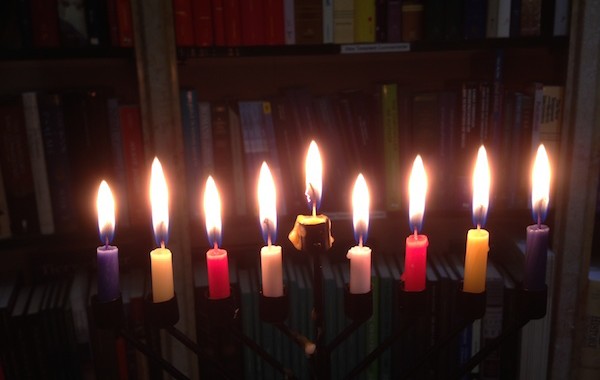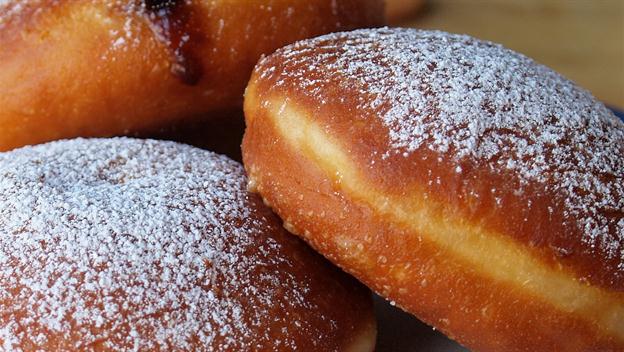The celebration of Hanukkah is a Jewish festival that is observed over the period of eight days. This particular Jewish festival is not biblically mandated, therefore, it is not observed with a traditional festival meal as the biblical Appointed Times are celebrated (Lev. 23).
Hanukkah: History & Tradition
Hanukkah, “The Feast of Dedication,” remembers the rededication of the Temple after Judah the Maccabee led his Jewish forces to retake Jerusalem. After defeating the Greek forces, Judah led the people in cleansing and restoring the Temple together with its altar.
According to the book of First Maccabees, it was on the 25th day of the ninth month (the month Kislev) in the year 165 BC (or possibly 164 BC) that the Temple was rededicated and sacrifices were again offered according to the Law. The Jews of that time celebrated this rededication of the Temple for eight days. They also made a decree that they should continue to celebrate with joy and gladness the rededication of the altar every year for eight days starting with the 25th day of Kislev (1 Maccabees 4:52-59) [Click here to read this text in Maccabees 4]. The word hanukkah in Hebrew means dedication.
According to Jewish tradition, when the Jews first dedicated the altar and Temple they relit the menorah in the Temple but there was only enough purified oil for one single day. It would take eight days to prepare more purified oil. It is believed that a miracle happened at that time and God allowed the purified oil of one day to last for eight days.
Only God knows whether or not this miracle actually occurred. Historically, however, we do know that the Temple was rededicated at this time and the eight-day celebration of Hanukkah recalls the Sovereign hand of God to give the Jewish people the privilege and opportunity to worship Him as He prescribed in the Torah through sacrifice and offering. The events of the trampling down of the sanctuary by the Greeks and the restoration of the altar in righteousness are prophesied in the Holy Scriptures (Daniel 8:9-14).
Hanukkah at the Time of Yeshua
We read in the New Testament book of John that Hanukkah is mentioned as “The Feast of Dedication” (John 10:22). One day during that particular Hanukkah celebration, Yeshua was walking in the Temple area and He was questioned by some Jewish people regarding whether or not He is actually the Messiah.
The Jewish people of His day asked Yeshua to tell them plainly whether or not He is the Messiah. Yeshua responded that He has already told them but that they did not believe Him. He then told them that the works that He does in His Father’s name testify to who He is. As a result of the power that flowed through Yeshua’s life the sick were healed, the lame walked, the blind received their sight, and the dead were raised (Luke 7:22-23). Miracles were being performed at the hands of Yeshua and prophecy was being fulfilled (Isaiah 35:5-6, 61:1). If the people believed in the miracle of Hanukkah, why wouldn’t they believe in the testimony of the miracles of Yeshua?
Hanukkah in Our Day
Today the festival of Hanukkah is celebrated with eight days of lighting candles and placing the Hanukiah, the eight-pronged candle holder, in the window for all to see as a witness that God still does miracles. An additional candle is also part of the Hanukiah as a servant candle, called the shamash, and is used to light the other candles. The shamash is also used to give light to the room as the other eight are only to be used as a testimony to the miracle of God.
Throughout the eight days of Hanukkah it is tradition to eat foods that are fried in oil and thereby remember the miracle of the oil that lasted for eight days instead of just one. Traditional foods eaten at Hanukkah are latkes (potato pancakes) and sufganiyot (jelly filled donuts).
Various songs and games are also included in the eight day celebration that begins each evening after sunset when the candles are lit. This year, 2021, Hanukkah will begin on the evening of Sunday, Nov. 28th and conclude on Monday, Dec. 6th.
Hanukkah Sameach! (Happy Hanukkah!)
If you enjoyed reading this article, share it today with friends! We also invite you to sign up for our weekly Torah Portion commentary on the sidebar to the right.
Help keep our weekly commentaries free and available to all. Click here to donate today:
Copyright Jewels of Judaism. All rights reserved 2020





Dear Daniel,
I forgot to mention in my previous comment that just as the Maccabees rededicated the Temple in Jerusalem, Yeshua dedicates every believer in Him:
1 Corinthians 6:19-20 Or do you not know that your body is a temple of the Holy Spirit who is in you, whom you have from God, and that you are not your own? For you have been bought with a price: therefore glorify God in your body.
Praise His Holy Name!
Sal:-)
Dear Daniel,
It is ironic that the only Biblical reference to the Feast of Dedication, Hanukkah, is in the Brit Hadashah and that that scripture records Yeshua’s attendance at that feast!
Is it possible that the first eight-day observance of Hanukkah was a long delayed celebration of the Feast of Taberncles, which the Jews could not observe without being in possession of the Temple in Jerusalem and it being properly consecrated unto the LORD, after the Gentiles had desecrated it?
On a personal note, to this day my Sicilian family cook sfinge (just as their ancestors had), which are very similar to the sufganiyot of Hanukkah. Prior to the Inquisition, approximately 6% of Sicily was Jewish and, apparently, Jewish culture influenced the culture of the island. For example, pork is still not a common food in Sicily.
You may also recall that I had once shared with you my mother’s account of my father and his siblings and their mother, my grandmother, gleaning wheat in the fields of their more affluent (but not by much, for they were all poor to varying degrees!) paesane.
Much Shalom,
Sal:-)
Hey Sal,
Thanks for sharing these insights. Very interesting to hear about the Jewish history of Sicily. It is definitely a possibility that Hanukkah was celebrated in a delayed fashion that first year after Jerusalem was retaken the Temple service reestablished, however, I haven’t heard that before.
Blessings,
Daniel